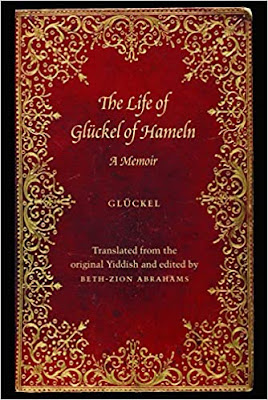The Life of Glückel of Hameln
The Life of Glückel of Hameln: A Memoir, by Glückel
I am so glad I ran into this book! It's truly one of a kind, I think. I'm surprised I didn't run into it earlier. It should be more widely known, outside of the world of Jewish history where it's long been a classic.
Glückel (1646–1724) was a Jewish-German woman from a Hamburg family. At fourteen, she was married to her husband and together they ran a successful business and had twelve children. Her husband died when they were only in their early forties, and she worked hard to keep up the business and marry off her children well. She was persuaded to marry again, to a wealthy banker, but he lost all their money before dying and she ended her life in poverty. Glückel wrote her memoirs -- in an early form of Yiddish -- for her children, on nights when she couldn't sleep because she was so sad about losing her beloved first husband. She wanted them to know where they came from, and what her life had been like.
The first few pages are missing from the surviving book, so we don't get to know much about Glückel's early life and family. She was betrothed at 12 and married at 14, because at that time Jewish families arranged their children's marriages early on, and then the young couple would live with the boy's parents for several years, learning how to run a business and getting established, before moving to their own home. All the Jewish families lived in their towns by permission, and were sometimes persecuted or expelled, so they had to be very careful in their businesses. Glückel paints a wide-ranging picture of 17th-century Jewish life in Germany (and even France), with her main concerns being her beloved husband, her adored children, and the family business. She constantly reiterates that she never owed anybody anything she couldn't pay, until her second husband lost all (and she tries to be pretty soft on him too).
All of this is mixed in with moralizing, exhortations to her children, stories to set examples, and expressions of faith. She notes that the most important thing is to love one another (but in these degenerate times people do not love each other), and to accept the Lord's will, whatever it may be. Don't grieve for losses -- "no matter what you may lose, be patient for nothing belongs [to you]; it is only lent." Glückel actually does quite a lot of grieving, but she also tries hard to accept her circumstances. All will be made well in "the future world."
This is such a fascinating memoir; it feels like a special opportunity to get to look into the life and thoughts of a woman who lived so long ago, since we have so few personal accounts like this. I loved 'meeting' Glückel and getting to know her. Highly recommended.





Comments
Post a Comment
I'd love to know what you think, so please comment!